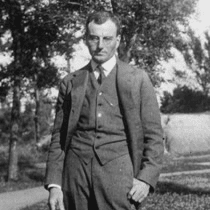“The history that does work in the world”
At the end of 1929 Prof. Carl Becker (1873–1945) of Cornell University addressed the American Historical Association as its president.
Among Becker’s previous books were The History of Political Parties in the Province of New York, 1760–1776; The Eve of the Revolution: A Chronicle of the Breach with England; and The Declaration of Independence: A Study in the History of Political Ideas.
He tended to study the formal political history of legislation and pamphleteering, though with a slightly jaundiced eye about what good that activity did.
The title of Becker’s talk in 1929 was “Everyman His Own Historian,” and it addressed the gap between the academic historian’s approach to the past and that of “an ordinary citizen without excess knowledge” or representative of “every normal person,” Mr. Everyman. (The norm, of course, being male.)
Becker said:
Among Becker’s previous books were The History of Political Parties in the Province of New York, 1760–1776; The Eve of the Revolution: A Chronicle of the Breach with England; and The Declaration of Independence: A Study in the History of Political Ideas.
He tended to study the formal political history of legislation and pamphleteering, though with a slightly jaundiced eye about what good that activity did.
The title of Becker’s talk in 1929 was “Everyman His Own Historian,” and it addressed the gap between the academic historian’s approach to the past and that of “an ordinary citizen without excess knowledge” or representative of “every normal person,” Mr. Everyman. (The norm, of course, being male.)
Becker said:
Mr. Everyman has a wholesome respect for cold, hard facts, never suspecting how malleable they are, how easy it is to coax and cajole them; but he necessarily takes the facts as they come to him, and is enamored of those that seem best suited to his interests or promise most in the way of emotional satisfaction. The exact truth of remembered events he has in any case no time, and no need, to curiously question or meticulously verify.But of course Becker concluded with a slightly jaundiced view of his own profession’s work:
No doubt he can, if he be an American, call up an image of the signing of the Declaration of Independence in 1776 as readily as he can call up an image of Smith’s coal wagons creaking up the hill last summer. He suspects the one image no more than the other; but the signing of the Declaration, touching not his practical interests, calls for no careful historical research on his part.
He may perhaps, without knowing why, affirm and hold in memory that the Declaration was signed by the members of the Continental Congress on the fourth of July. It is a vivid and sufficient image which Mr. Everyman may hold to the end of his days without incurring penalties. Neither Brown nor Smith has any interest in setting him right; nor will any court ever send him a summons for failing to recall that the Declaration, “being engrossed and compared at the table, was signed by the members” on the second of August.
As an actual event, the signing of the Declaration was what it was; as a remembered event it will be, for Mr. Everyman, what Mr. Everyman contrives to make it: will have for him significance and magic, much or little or none at all, as it fits well or ill into his little world of interests and aspirations and emotional comforts.
Berate him as we will for not reading our books, Mr. Everyman is stronger than we are, and sooner or later we must adapt our knowledge to his necessities. Otherwise he will leave us to our own devices, leave us it may be to cultivate a species of dry professional arrogance growing out of the thin soil of antiquarian research. Such research, valuable not in itself but for some ulterior purpose, will be of little import except in so far as it is transmuted into common knowledge. The history that lies inert in unread books does no work in the world.
The history that does work in the world, the history that influences the course of history, is living history, that pattern of remembered events, whether true or false, that enlarges and enriches the collective specious present, the specious present of Mr. Everyman. It is for this reason that the history of history is a record of the “new history” that in every age rises to confound and supplant the old.
It should be a relief to us to renounce omniscience, to recognize that every generation, our own included, will, must inevitably, understand the past and anticipate the future in the light of its own restricted experience, must inevitably play on the dead whatever tricks it finds necessary for its own peace of mind.


No comments:
Post a Comment